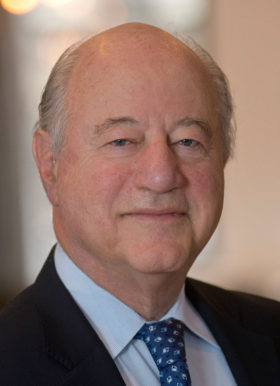
Gerald D. Fischbach
Gerald D. Fischbach, MD, is widely recognized as a scientific leader and pioneering researcher in the United States. He possesses a deep understanding of his field, neurobiology, and vast knowledge of science in general. Fischbach received an honorary doctor of science degree on May 15, 2015.
Dr. Fischbach joined the Simons Foundation in 2006 to oversee the Simons Foundation Autism Research Initiative and now is the foundation’s first chief scientist and its first fellow. The foundation’s goal is to advance the frontiers of research in mathematics and the basic sciences.
In his roles for the organization, Dr. Fischbach contributes to the foundation’s scientific endeavors, including its life sciences, mathematics and physical sciences divisions, and its autism research initiative. He also spearheads collaborative projects in neuroscience research and advises the foundation on education and outreach.
Formerly, Dr. Fischbach served as dean of the faculty of health sciences at Columbia University and director of the National Institute of Neurological Disorders and Stroke of the National Institutes of Health (NIH).
He subsequently became the Edison Professor of Neurobiology and head of the Department of Anatomy and Neurobiology at Washington University School of Medicine and, later, the Nathan Marsh Pusey Professor of Neurobiology and chairman of the Department of Neurobiology at Harvard Medical School and Massachusetts General Hospital.
How nerve cells communicate
Dr. Fischbach studies the formation and maintenance of synapses, the contacts between nerves cells and their targets through which information is transferred in the nervous system.
He has been particularly interested in the neuromuscular junction, a synapse that is easily accessible to experimental manipulation. He pioneered the use of nerve cell cultures to study the shapes of nerve cells and the electrical and chemical signals they use to communicate among themselves and with muscle cells.
“The human brain is one of the most complex objects in the known universe,” he said. “The complexity is not simply due to the billions of nerve cells or the trillions of connections between them, but in large part it relates to how these connections, called synapses, change with experience as we live in this world.
“I have spent my career studying how synapses form in the embryo and how they are modified throughout adult life,” he said.
Dr. Fischbach is a past president of the Society of Neuroscience and serves on several medical and scientific advisory boards. He is a member of the National Academy of Sciences, the American Academy of Arts and Sciences and the Institute of Medicine.
He is a fellow of the American Association for the Advancement of Science and a former nonresident fellow of the Salk Institute.
Other honors include the McKnight Endowment Fund for Neuroscience Senior Investigator Award and the Foundation Ipsen Neuronal Plasticity Prize. He also was awarded an honorary master’s degree from Harvard and an honorary doctorate from Colgate University.
Dr. Fischbach earned a bachelor’s degree in mathematics and chemistry in 1961 from Colgate University in Hamilton, New York, where he was a four-year recipient of the New York State Regents Scholarship.
He earned a medical degree in 1965 from Cornell University Medical School and interned at the University of Washington Hospital in Seattle.
He began his research career in 1966 at the NIH, where he served as a senior surgeon at the National Institute of Neurological Disorders and Stroke and then a fellow at the National Institute of Child Health and Human Development.
He said recent breakthroughs in neurobiology have shed new light on synapse formation and plasticity, but there is always more to learn. “Such discoveries have had profound effects on useful therapies for developmental disorders and neurodegeneration in the aging, however, my deep conviction is that fundamental, basic science will remain the essential driver for useful therapeutics in the future,” Dr. Fischbach said.
“The thrill of discovery and the realization of ultimate applicability is what drew me to neuroscience and what has kept me focused over the years.”
Dr. Fischbach and his wife, Ruth, a professor of bioethics in psychiatry at Columbia Presbyterian Medical Center, live in the Bronx, New York. They have four children.